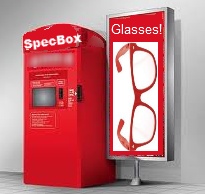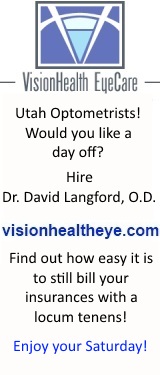 “Use of Optical Scan Machines” H.B. 408 Utah State Legislature 2012
“Use of Optical Scan Machines” H.B. 408 Utah State Legislature 2012
It turns out they are rightfully worried because while the title, “Use of Optical Scan Machines,” might seem innocuous, what is really behind the curtain is pernicious.
While there is currently no text on the le.utah.gov website for H.B. 408, sources say that the bill’s sponsor, Greg Hughes, from Draper, UT (home of 1800Contacts) intends to allow the current prescription law to be changed to allow a person to buy glasses based on the reading of an autorefractor.
Apparently, the plan is for a company, like 1800Contacts, to set up a Glasses Kiosk in a popular store, like Walmart. (By the way, 1800Contacts has been selling glasses for a while.) The person puts their head in the machine, the autorefractor spits out some glasses numbers, a pupilometer measures a p.d., the person selects their frame and lens options, then they slide their credit card and wait for their glasses to arrive in the mail. (Maybe a nicer kiosk would measure the Rx in your current glasses and have you look at an eye chart, and factor those measurements into the numbers the kiosk “prescribes” you.)
If allowed, I predict an unintended consequence will be that no optical will adjust your glasses for free, like they currently do. You will have to show a receipt just to get your glasses adjusted, so everyone buying glasses from kiosks or internet sites will walk around looking like goobers and in pain from poorly adjusted glasses.
Other obvious consequences will be that people will walk around with headaches and blurry vision since autorefractors are notoriously inaccurate and will usually over-estimate nearsightedness and underestimate farsightedness. And say nothing of the fact that many people need prism to see straight/avoid headaches.
But here is the biggest reason to forsake this bill: People need eye exams to ensure good eye health. A refraction is only one piece of a complete eye exam. I’ve already written about the woman who only wanted more contacts, but because she had an eye exam, I saw some worrisome findings and referred her for more specialty care which discovered a brain tumor.
That’s just one patient. I’ve actually done that a couple times with brain tumors. Other times I’ve had patients whom I’ve diagnosed leukemia, diabetes, pituitary adenoma, increased cerebral spinal fluid pressure, glaucoma, macular degeneration, eye infections, allergy eyes, and more all just from a “routine eye exam.” None of these people thought there was something wrong- they just wanted new glasses or more contacts.
We can’t ignore that an eye exam is more than just looking at an eye chart and getting a refractive prescription.
But let’s say you wanted to. Let’s say you are simply a consumer advocate who wants to help people buy glasses. Your idea is to waste everyone’s time and money by making a law to separate the refraction from an eye exam. The consumer who values their eye health will simply also get an eye exam in addition to buying a glasses Rx and purchasing spectacles from a kiosk.
Okay, Utah Legislature, why are you stopping there? What if I’m a business that wants to sell antibiotics cheaper, to more people, than the present system of physicians and pharmacies? I want to set up kiosks that take your temperature. If you have a high temperature, you get vended an antibiotic. Sounds great for consumers, right? Why should eye care providers and opticals be the only ones to suffer? Make physicians and pharmacies suffer as well!
If you want to change the system, change it fairly for everyone. Let’s be just like third world countries which don’t require doctor prescriptions at pharmacies or optical shops. If it’s about consumer advocacy, what could be better, right?
Of course, you will essentially be forcing a large portion of health care providers to change professions. And don’t even mention how news reports will be full of people self treating, taking the wrong medicine for the wrong diagnosis, and dying. It’s a small price to pay for consumer choice, but since I have some libertarian leanings, I wouldn’t mind trying it out as long as every medical profession participates and not just optometrists.
However, if you don’t think that all roads should be toll roads and marijuana should be legal, then let’s continue to require prescriptions for medicines and medical devices, like glasses and contacts.
Choose one, Utah Legislature. Just be consistent across all professions to make the playing field level.
If you have an opinion on 2012’s H.B. 408, then contact your Utah lawmaker.
On a side note, I hope the sponsor of H.B. 408, Greg Hughes, is happy with himself. The UOA is burning tens of thousands of dollars (that it can’t afford) on lobbyists that only work for six weeks to fight H.B. 408. Even if HB408 is defeated this year, who knows if it will come up again next year and they’ll have to spend more money again! Mr Hughes, I’m not sure how you can sleep at night. You are causing poor optometrists to spend tons of money fighting legislation that you introduced only because a big business told you to. Even if you said you were sorry and withdraw the bill, you can’t un-burn the cash you’ve caused to be burned.
Please, lawmakers, try to think outside your wallet when making decisions about bills to consider during legislative sessions. I propose we only allow you to meet every two years in order to provide more stability for us business owners.













Thinking about 1800’s endgame, it occurs to me that 2012’s UT HB408 is just a stepping stone. If HB408 passes then look for a bill in 2013 which legalizes a kiosk that would not only autorefract you, but it would also take an autokeratometer and HVID measurement and show you a pick list of contacts that you could buy.
It’s all about the consumer, right?
I guarantee that if a box can refract opticians will be bitchin’ to be able to.
[…] The UOA used a little 409 on HB408.The Utah Optometric Association reported in an e-mail to its members on Friday Feb. 17, 2012 that the UOA’s lobbyist has word from Rep. Hughes that he will not run HB408. […]
This bill has been scuttled for 2012. See this post: https://optoblog.com/2012/02/22/utah-hb408-swept-away-for-2012/
This article’s overall paranoia reminds me a little bit of the satirical “Candlemakers’ Petition” (http://bastiat.org/en/petition.html) in its objection to competition for established businesses. Some people need inexpensive options for glasses. Insurance is not always an option. I see this as a net benefit for society.
Considering that there are 86,000 adverse prescription drug deaths per year in the US right now, I wonder if a “third world” approachigjt actually be better for us. That, plus the high rate of deaths due to “medical errors”, it seems like the current regulated mexdical industry needs to take a hard look at itself, and accept some competition.
David,
It is all about the consumer isn’t it? After all your argument against this bill is to prevent the loss of those consumers to these kiosks. Your arguments speak to the lower quality of care those consumers would receive in an effort to have the government intervene on your behalf and force the consumer to use your service. Your argument about not requiring prescriptions for antibiotics does not equate, in that by allowing people to be prescribed antibiotics in that way you are affecting everyone who uses the antibiotics because they may not be as effective in the future as a result. Will an optometrists services become obsolete because of these kiosks? According to the arguments put forth in your article they would not. If these kiosks are so ineffective at doing the job then you have nothing to worry about and the businesses who invest in these machines will lose their money. I suspect these kiosks may be more effective than you let on for one reason and that is that the union did spend so much money fighting to keep them out of the market. Lastly, your comment about marijuana at the end of your article show you to be somewhat of a hypocrite. While you say you would support HB408 as long as it is, ” consistent across all professions to make the playing field level.” You argue the absurdity of legalizing marijuana and yet a worse drug “alcohol” is perfectly legal, hardly a consistent position.
You should check out Bastiat’s “the candle maker”. I see you have very similar logic.
Your invocation of the Candlemakers Petition is a non sequitur.
When we replace our ER physicians with computers, then we can replace our optometric physicians with kiosks.
After reading your article, I am amazed that you are not a member of the UOA. With a small business to protect, why wouldn’t you want to be a part of an organization that is trying to do just that?
This is comical. I’m a Optician. And though I learned how to refract in school. I only do it now when I need to. And that’s usually due to a horrible O.D. In Ca there are many. I would not be lining up to want to refract.
After a hundred year history of advancing the profession of optometry to Physician status it is sad to see so litle comprehension in the public of the need for eyehealth care. Dentestry did it but they have PAIN as an ally.
Just as this will help the mega corporations sell glasses and contacts, fallout industries will also benefit..think of the increased sales for phartmaceutical analgesics, talking books, stylish white canes and all the dogs that will be saved from deathrow to be service dogs.
Spectacle and contact lens profit margins are seen by consumers as greed, not the ability of a business to support a bricks and mortar office setting.
Ah there’s the rub..they are no longer patients to be cared for but ambulatory consumer dollars to be had
The amorality of American Business
I’ve got mine
I’ve got mine screw you
I’ve got mine, I want yours
After the Terminators Walmart and the now legit monied Lenscrafters take over the world of eyewear and eyecare throught their verticle and locklin insurance schemes consumers may ultimately wonder where the quality went..they’ll be told that’s as good as it gets..here’s your money back or not….go away
I wonder if Utahians(?) ever wonder where the fellow from 1800xxxxx ‘s home town developes his insights to consumer needs and insights , home and cash flow as a “legislator”